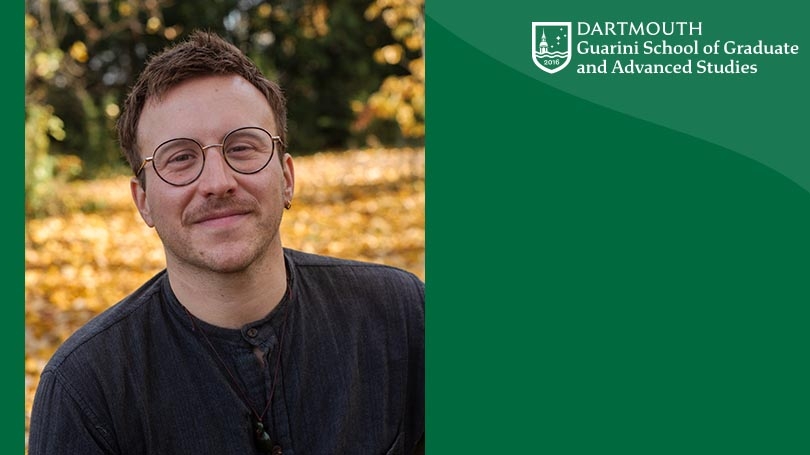
- About
- Undergraduate
- Graduate
- Foreign Study
- Research
- News & Events
- People
Back to Top Nav
Back to Top Nav
Back to Top Nav
Back to Top Nav
Back to Top Nav
As flooding and other catastrophic weather events appear with increasing intensity and frequency in our world, displacing peoples, disrupting food and other supply chains, and exerting higher demands on our infrastructure, understanding and addressing climate change becomes an urgent task we can no longer relinquish. This is something Grant Gutierrez, PhD candidate in the Ecology, Evolution, Environment, and Society (EEES) program, has long known and his work in understanding the environmental impact of humans on our waterways has been recognized by a prestigious award from the Robert & Patricia Switzer Foundation.
The award is presented to emerging environmental leaders and offers both a cash prize and leadership training to support their graduate studies and career development at universities in New England and California. Switzer Fellows arensupported throughout their careers to pursue interdisciplinary and collaborative work, and the 2021 Switzer Fellows join a network of nearly 700 Switzer Fellows working across the United States and around the world.
Gutierrez joined the EEES program in 2016 with an A.B in anthropology with a Special Concentration in Sustainable Development from Columbia University, New York. After a period of working in Seattle in the environmental nonprofit world, the opportunity to work with Dr. Laura Ogden in the EEES program matched Gutierrez's interdisciplinary interests and offered him a chance to widen the scope of his research into biophysical and ecological sciences.
"I have a keen curiosity about how science and scientists go about understanding things like watersheds and river systems, as well as how people make meaning out of these places," Gutierrez says. "EEES strives to incorporate those ideas into graduate training. At the core, and as an anthropologist, I think it's crucial to learn, think, act, and communicate across difference, some of that difference being disciplinary boundaries themselves. Our current moment demands nimble thinkers who work across difference, and my graduate training in EEES has helped to prepare me for that kind of problem-solving."
Since joining EEES he has worked with faculty on research into watershed management policies and the effects on communities living in impacted areas. Gutierrez has published his research in peer-reviewed journals and edited volumes on political ecology, social movements, water resource management, and hydropower development. This brings his work as an environmental anthropologist examine community engagements with river restoration efforts, environmental justice, and the intersection of ecology and environmental science with environmental policy and management.
"I am truly humbled and grateful to have received the Switzer Environmental Fellowship and to join a network of such dedicated and engage environmental professionals. Traditional academia doesn't always provide - or encourage - the opportunities to apply theoretically driven research to help others, and I'm excited to find those kind of mentorship and career opportunities through the Switzer network," Gutierrez says.
"The worlds of research, especially at the graduate level, sometimes feel like a constant cycle of rejection and critical-constructive feedback," he adds. "Receiving this fellowship has been a timely reminder that the work hours I put in are valued. Sometimes having someone outside say "hey, you're doing good work" can mean all the difference. The fellowship will help support me in my final year of my dissertation to continue my community-based collaborative work in the Seattle area. You'd think that at the end of a dissertation, research would start to slow down, but for me, it's picking-up steam!"
The 2021 Switzer Fellows attend a variety of schools and academic programs and bring an impressive breadth of backgrounds and expertise on topics including environmental justice, climate change, public health, law, international development, community organizing, architecture, sustainable agriculture and fisheries, Indigenous stewardship and governance, clean energy, education, and coastal and river restoration. More information about the 2021 Switzer Fellows, and links to their profiles, is available HERE.